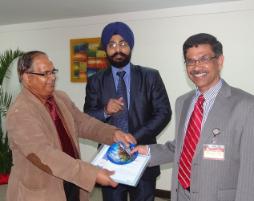Climate change in Bangladesh 'unprecedented' says awarded researcher
Published on 24 January, 2013
Climate change taking place in Bangladesh is so rapid that it is unprecedented in the history of the earth and can only be attributed to anthropogenic (human) activities...
That is according to CQUniversity's Associate Professor Saleh Wasimi whose paper on 'Implications of climate change in Bangladesh' earned the best paper award during the 3rd International Conference on Chemical, Ecology and Environmental Sciences (ICCEES'2013) held in Bali recently.
In his paper, Dr Wasimi identified many indicators supporting the view that climate change is taking place at such a rapid pace that it can only be attributed to anthropogenic activities.

Associate Professor Saleh Wasimi (right) receives his 'best paper' award"For Bangladesh, with reliable observations, it has been found that the sea level rise, night-time increase of temperature and decline in the availability of freshwater are statistically significant," he says.
"The statistical tools used are widely accepted by the scientific community and recommended by the World Meteorological Organisation.
"I chose Bangladesh because it is the only nation that had the courage to mention in the last assembly of the United Nations that it would take the developed nations to the international court for the adverse effects of climate change," Dr Wasimi says.
"Earlier, many nations, especially the island nations, were clamouring in international forums about this for many years and were saying that they are suffering for a problem that they did not create, yet it fell on deaf ears of the developed nations.
"The developed nations are in denial because they do not want to give up the lifestyle they are already enjoying, and tackling climate change would entail some hardship.
"The general public are confused by the climate change sceptics because they are employing the same strategies as they employed in the 1960s for tobacco smoking, which is to ask 'are you 100% sure that smoking causes lung cancer?'.
"Of course, no scientific research can be 100% sure, and thus a scientist would say no, and then the sceptic would cite some other possible reasons to confuse the public."

